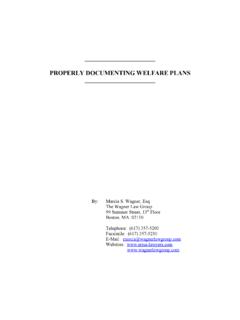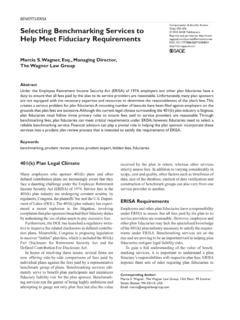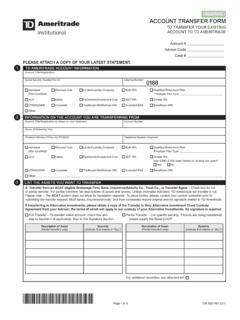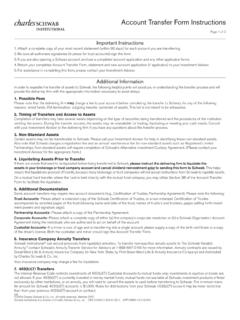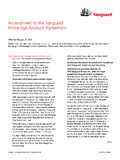Transcription of WHO IS A FIDUCIARY? - Wagner Law Group
1 WHO IS A fiduciary ? February 2008. by: Marcia S. Wagner , Esq. The Wagner Law Group A Professional Corporation 99 Summer Street, 13th Floor Boston, MA 02110. Tel: (617) 357-5200. Fax: (617) 357-5250. _____. TABLE OF CONTENTS. _____. Page I. Are You A fiduciary ?..1. B. What is a fiduciary 's Basic Duty?..2. II. Hidden 401(k) Plan Fees and III. Do You Need Professional Liability Insurance?..9. IV. The Benefits of a fiduciary WHO IS A fiduciary ? I. Are You A fiduciary ? At what point in its efforts to assist an employer with the employer's responsibilities in relation to a 401(k) plan does an investment professional take on a fiduciary role under the ERISA? This is a critical question, since ERISA has rules governing fiduciaries that do not apply to non- fiduciary service providers.
2 ERISA fiduciaries are either named in the plan document or are identified by the function they perform for the plan. Since fiduciary status may be based on a person's conduct rather than his title, it is possible to be a fiduciary without being aware of it. Regardless of whether he has knowledge of his status, an ERISA fiduciary must (1) act for the exclusive purpose of providing retirement benefits to plan participants, (2) fulfill a duty of loyalty to the participants, (3) act prudently, and (4) avoid conflicts of interest and acts of self-dealing known as prohibited transactions. The definition of a fiduciary includes any person who exercises any authority or control respecting the management or disposition of plan assets.
3 Assuming that an investment professional lacks such control, he could also be a fiduciary to the extent that he renders advice for a fee or other direct or indirect compensation, with respect to any moneys or other properties of the plan, or has any authority or responsibility to do so. In other words, if you receive compensation for which you have the responsibility to provide investment advice or for which you actually provide investment advice, you will be a fiduciary . Definition of Investment Advice fiduciary . Section 3(21)(A)(ii) of ERISA includes within the definition of fiduciary a person that renders investment advice for a fee or other compensation, direct or indirect, with respect to any moneys or other property of a plan, or has any authority or responsibility to do DOL regulations have amplified this definition by stating that a person will be viewed as rendering investment advice only if both of the following conditions are met.
4 (1) the advice relates to the value of securities or other property or constitutes a recommendation as to the advisability of investing in, purchasing, or selling securities or other property, and (2) either (a) the person has discretionary authority or control with respect to purchasing or selling securities or other property for the plan, or (b) the person renders advice to the plan on a regular basis under an agreement or understanding (written or otherwise) that the advice will be the primary basis for investment decisions with respect to plan assets, and that it will consist of individualized investment advice to the plan based on its particular needs. The particularized needs of the plan include such matters as investment policies or strategy, overall portfolio composition, and diversification of 1.
5 Under ERISA Section 3(21)(A)(i), the definition of a fiduciary also includes anyone who exercises any authority or control respecting management or disposition of plan assets. 2. DOL Regulation Section (c)(1). As noted, to characterize a person rendering investment advice as a fiduciary , he or she must be compensated for the advice. The compensation may take the form of a fee paid by the plan or the plan sponsor or some other form of indirect compensation paid by a third party, such as a mutual fund. The receipt of a commission may be sufficient for this purpose, even though no payment has been specifically allocated to the provision of investment advice. Indirect forms of compensation, such as 12b-1 fees, soft-dollar arrangements and revenue sharing, pursuant to which an adviser receives something of value from an investment provider, would be taken into account for purposes of determining fiduciary status.
6 The test for determining fiduciary status is a functional one. In other words, if a person renders investment advice, as described above, for which he is compensated, he will be considered to be a fiduciary regardless of his title or official designation. The activities of many broker-dealers would cause them to be treated as plan Nevertheless, not every broker would come within this definition, and we note that the regulation relating to investment advice fiduciaries has an exemption for stockbrokers that provides that a broker shall not be deemed to be a fiduciary solely because he executes transactions for the purchase or sale of securities on behalf of a plan in the ordinary course of business pursuant to the instructions of a plan fiduciary Duty.
7 The basic duty of a fiduciary under ERISA is to discharge his or her duties solely in the interest of the plan's participants and beneficiaries and for the exclusive purpose of providing benefits for the participants and their beneficiaries and defraying reasonable administrative costs of the plan. Affirmative fiduciary duties include such responsibilities as selecting proper investments and monitoring them to ensure that they yield a reasonable return, properly diversifying investments, seeing to it that the plan has sufficient liquidity, and managing the administrative aspects of the II. Hidden 401(k) Plan Fees and Expenses A. Background. An important part of a fiduciary 's responsibility includes identifying, understanding, and evaluating fees and expenses associated with plan investments, investment options and services.
8 When they initially consider a new investment, fiduciaries should be aware of all hard dollar payments made directly by plans as well as revenue sharing . and similar payments made indirectly by third parties. The latter are sometimes referred to as hidden fees. Fiduciaries should also monitor such payments to determine if they continue to be reasonable. While the reasonableness of fees and expenses is a concern for all qualified plans, it is particularly important for 401(k) plans, because they generally bear a higher proportion of the fees and expenses. Monitoring fees and expenses is an ongoing fiduciary responsibility. 3. See Ellis v. Rycenga Homes, Inc., No. 1:04-cv-694, 2007 WL 837224 ( Mich. 2007), in which a broker's consultations on investment matters over a plan's 20-year history resulted in a summary judgment concluding that the broker was a plan fiduciary .
9 4. DOL Regulation Section (d). 5. ERISA Sections 403(c)(1) and 404(a). 2. B. Types of Hidden Fees. There are at least eight kinds of hidden 401(k) plan fees and expenses that fiduciaries need to be aware of: (i) SEC Rule 28(e) Soft Dollars, (ii) Sub- transfer Agent Fees, (iii) 12b-1 Fees, (iv) Variable Annuity Wrap Fees, (v) Investment Management Fees, (vi) Sales Charges, (vii) Revenue Sharing Arrangements, and (viii) Float. 1. SEC Rule 28(e) Soft Dollars. Brokerage firms may charge extra commission that can be used by investment advisors and others to purchase services, such as, valuable investment research. Such excess commission must be reasonable with respect to the services provided. Illegal Rule 28(e) fees violate ERISA Sections 403(c)(1), 404(a)(1) and 406(a)(1)(D).
10 Fiduciaries should know whether they are being charged Rule 28(e) fees. 2. Sub-transfer Agent Fees. Brokerage firms and mutual funds often sub-contract recordkeeping and other services related to participant shares to a third party called a sub-transfer agent. Payments to these third parties are sub-transfer agent fees. The problem is not the receipt of such fees by the third parties, but whether the fee fairly represents the value of the services being rendered. The DOL, in its publication A Look at 401(k) Plan Fees, has made it clear that a plan sponsor must understand the value and associated compensation of each company providing services to the plan. 3. 12b-1 Fees. 12b-1 fees are, in general, distribution expenses paid by mutual funds from fund assets.


